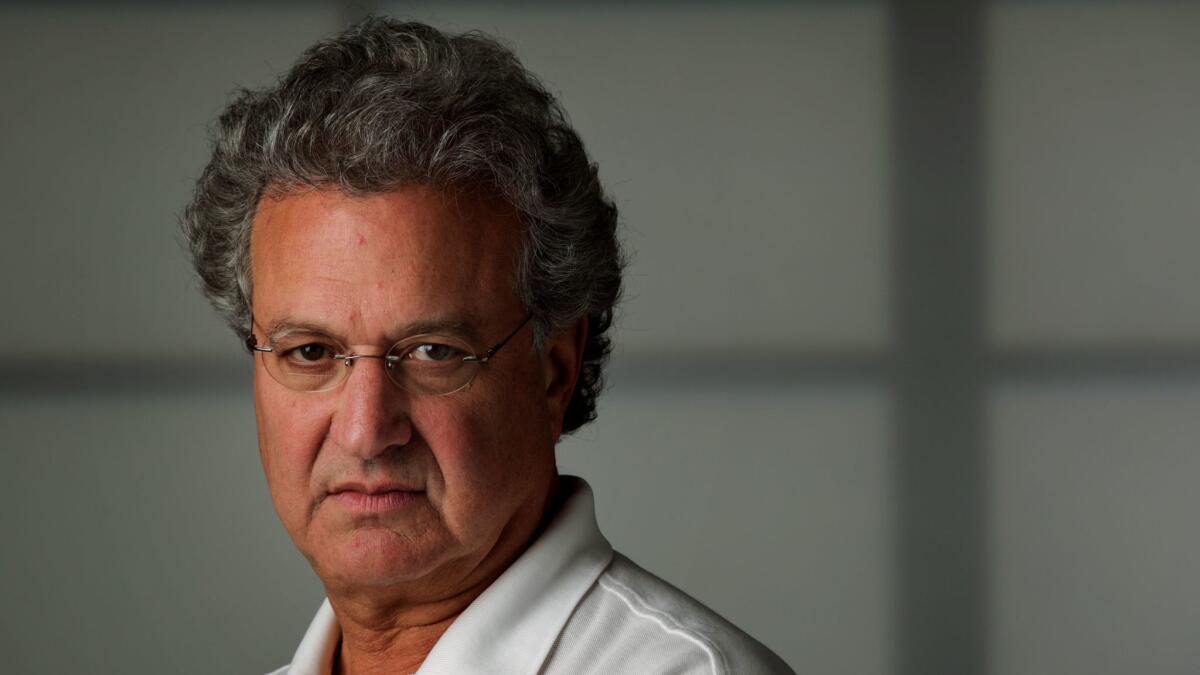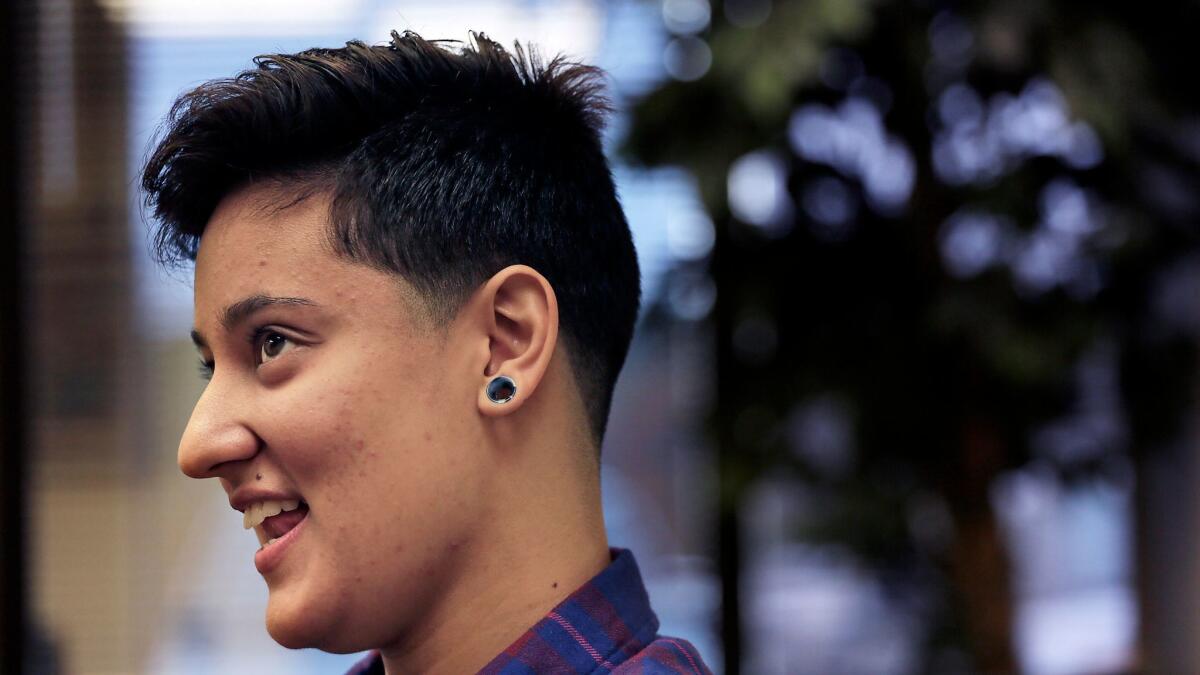Q&A: ‘There’s a virus in our country’: The ‘Trump effect’ and rise of hate groups, explained

- Share via
Not long after it launched in 1971, the
Since then, the Montgomery, Ala.-based nonprofit has filed dozens of lawsuits over the years targeting groups that include law enforcement and government officials. It’s helped dismantle a host of Ku Klux Klan and other white supremacist groups around the country by winning millions on behalf of its clients in court cases against them, sending a few into bankruptcy.
And since the election of
In February, the law center reported that its count of hate groups in the country increased for the second consecutive year and that the number of anti-Muslim organizations had nearly tripled within a year. It attributed the growth to “Trump’s incendiary rhetoric” on Muslims and the reaction to the June 2016 mass shooting at the Pulse nightclub in Orlando, Fla.
But the prominent civil rights group has also faced renewed criticism. Conservatives say it’s too quick to label organizations and individuals as hate groups or extremists for opposing lesbian, gay, bisexual, transgender and queer rights. Last year, the group faced questions for naming Ayaan Hirsi Ali, a Somali-born ex-Muslim author and former Dutch politician, and Maajid Nawaz, the founder of a British anti-extremism think tank, to its list of “anti-Muslim extremists.” In 2015, the group apologized for putting Ben Carson, who is now the secretary of Housing and Urban Development, on its list of extremists.
More recently, critics have said the organization puts too much blame on Trump for intolerance that also was there during the
The Los Angeles Times sat down with Richard Cohen, a lawyer who was named president and chief executive officer of the Southern Poverty Law Center in 2003, discussing topics including Trump, hate crimes and the group’s mission in the coming years.
Donations to your organization have shot up since the election. Why?
Mr. Trump ran a campaign marked by racism, xenophobia, crude racial stereotypes and anti-Semitic imagery. And after he was elected, many white supremacists were celebrating. Usually, white supremacists just sit out elections and think that political parties are irredeemably corrupt. The combination of his racist campaign and the attacks on political correctness told many people that the gloves are off and they could act, unfortunately, with their worst instincts.
The day after the election, we put up a reporting form about hate incidents on our website, and within 10 days we had collected almost 900 incidents. It told us the fault lines where our country has historically been weak have been opened again. It’s going to take the collective efforts of all of us to close them.
Were those fault lines opened with Obama?
To some degree after President Obama was elected, white supremacists went crazy. We saw an outbreak of hate crimes that coincided with Mr. Obama’s election. But not to this extent.
There was nothing in Mr. Obama’s 2008 election or in the campaign that corresponded to what happened in the 2016 election. Obama represented the kind of change that a lot of people were scared of, but I think what’s happened now is much, much worse.
Many Trump voters are also against racism and hate groups.
I think there are a lot of people who flocked to Trump’s candidacy because they felt as if they were strangers in their own land with the changing demographics in our country, the dislocations caused by globalization, and the rise of LGBTQ rights. All of those things contributed to a sense for many people, particularly white working-class people, of alienation.
Saying that is a far cry from painting them all as a “deplorables” or suggesting that they are all out there committing hate crimes.
On Friday, a white supremacist killed two men and injured a third when they defended a pair of teenage girls, one a Muslim wearing a hijab, on a Portland, Ore., train, according to police. In an attack in March, a white supremacist traveled from Baltimore to New York with the goal of finding a random black person to kill. Are there more people holding white supremacist views?
There's a virus in our country. It's a virus called "hate."
When we look at the number of hate groups, we've seen an increase in the past 15 years. When we look at people engaged in online hate, like people who are registered users of something like [the white supremacist website] Stormfront, you'll see an increase.
This fellow in Portland, he rants and raves. We're looking at somebody who was bitter, resentful, racist. Unfortunately, there are a lot of people like that.
What has changed since the Southern Poverty Law Center started in 1971? Are you repeating the same fights?
In the ’60s, they blew up the 16th Street Baptist Church [in Birmingham, Ala.] to put a hold on black progress. There was a tremendous backlash against the March [on Washington for Jobs and Freedom in 1963]. Now, we’re seeing a different kind of backlash to the browning of America. It is similar to what we saw in the ’50s and ’60s, but it is also different.
When the Southern Poverty Law Center was founded, less than 1 in 5 people in our country were nonwhite. Today, that figure is more than double and the country is having growing pains. We’re not going to go through a change like this without there being some sand in the gears.
We don’t endorse candidates, and we thought that Trump was likely going to lose because of what the polls said. At the same time, we thought that “Trumpism” would continue because of the forces that propelled his candidacy.
How will your work change under this administration?
So many things in the
The big issue is immigration. We’re establishing a project to provide pro bono representation to everyone in the Southeast facing deportation. Detention facilities there tend to be located in remote areas where people do not have any chance of getting a lawyer. One of our first cases was [that of Mississippi “Dreamer”] Daniela Vargas.

Some Christian groups have protested the law center, listing them on the same pages as the Klan and Westboro Baptist Church (a church in Kansas notorious for its anti-gay hate speech). How do you define a hate group?
We define hate groups as those that vilify entire groups of people for characteristics such as race, religion or their sexual orientation. The propensity for violence is not a criterion for listing as a hate group. So sometimes groups that really have no propensity for violence, although their rhetoric might foment it, object to be listed with the Ku Klux Klan. I understand that.
Groups like Family Research Council promote the claim that we’re listing them because they’re against gay marriage. It’s not true and they know it. We list groups like that because they spread demonizing lies about the LGBTQ community. Like the false idea that gay men have a high propensity for pedophilia.
Now, there are groups like
What about transgender rights? The issue of bathroom access has become a major political battle.
We wouldn’t call a group a hate group because they are opposed to transgender people’s access to bathrooms that match their gender. But if you describe transgender people as inherently evil, we might.
There’s been a lot of conflict about free speech and hate speech. Plans for events with Ann Coulter and Milo Yiannopoulos have become the targets of violent clashes in Berkeley. Where does the law center stand?
You have the right to hate in this country. You just don’t have the right to hurt people.
Now, the argument of the campus protesters would be that the mere presence of those kinds of words actually does hurt people, that it poisons the atmosphere. That is a slippery slope.
On the very day that we filed a lawsuit against [the neo-Nazi website] Daily Stormer, [white supremacist] Richard Spencer was in Auburn, Ala., at a college. And the university tried to block him from speaking, and the federal judge said that that action was unconstitutional. He was right.
I’m not a college administrator. I do not face the problems that they do. But I’ve admired the sense of the University of Chicago that has said it’s going to allow provocative, controversial ideas because we’re a free country and we ought to be exposed to that. We fight bad ideas with good ideas.
Questions and answers have been edited for length and clarity.
Jaweed Kaleem is The Times' national race and justice correspondent. Follow him on Twitter, Facebook and Instagram.
ALSO
Neo-Nazi website unleashed Internet trolls against a Jewish woman, lawsuit says
ACLU sues LAPD over 'systemic violation' of public records law
Judge throws out lawsuit challenging California's execution law
Sign up for Essential California
The most important California stories and recommendations in your inbox every morning.
You may occasionally receive promotional content from the Los Angeles Times.








